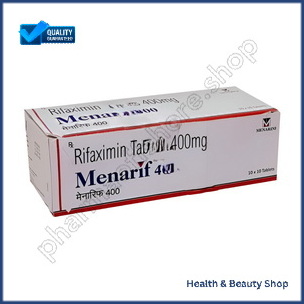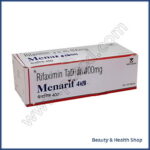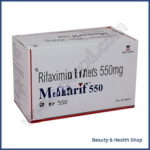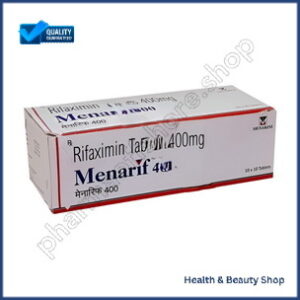ADDICTION
ALCOHOL DEPENDENCE
QUIT SMOKING
ALLERGY
ANTI FUNGAL
FUNGAL INFECTION
FUNGAL NAIL INFECTIONS
ANTI-REJECTION DRUGS
ANTI WORM
ANTIBIOTIC
BACTERIAL INFECTIONS
ARTHRITIS
GOUT
OSTEOARTHRITIS
RHEUMATOID ARTHRITIS
BLOOD
LOW PLATELET COUNT
THROMBOPHLEBITIS
VARICOSE VEINS
COLON
ANAL FISSURE
PILES
ULCERATIVE COLITIS
DIABETES CARE
DIABETES INSIPIDUS
DIABETES TYPE
DIABETIC FOOT ULCERS
GLUCOSE MONITOR
EYES/EAR CARE
DRY EYES
EYE CARE
EYE EXAMINATION
EYE INFECTION
EYE LASHES
EYE PAIN
GLAUCOMA
OCULAR HYPERTENSION
UVEITIS
FEVER CARE
MALARIA
RHEUMATIC FEVER
TYPHOID FEVER
GASTROINTESTINAL
ACIDITY
CONSTIPATION
CROHN'S DISEASE
DIARRHOEA
GALLBLADDER STONES
INTESTINAL ULCERS
IRRITABLE BOWEL SYNDROME
MOTION SICKNESS
NAUSEA
Menarif (Rifaximin)
Menarif 400 mg (Rifaximin)
Menarif 550 mg (Rifaximin)
| Active Ingredient (Generic Name): | Rifaximin |
|---|---|
| Indication: | Irritable bowel syndrome, Hepatic encephalopathy |
| Manufacturer | Menarini India Pvt Ltd |
| Packaging: | 10 tablets in one strip |
From: $44.00
Considering Menarif, a brand name for Rifaximin, a nonsystemic antibiotic targeting harmful gut bacteria to alleviate symptoms of irritable bowel syndrome with diarrhea (IBS-D) and hepatic encephalopathy. This medication is used for managing IBS-D symptoms, treating hepatic encephalopathy, and reducing bacterial overgrowth in the gut. Rifaximin functions by blocking bacterial cell wall synthesis, targeting harmful bacteria, and inhibiting RNA synthesis crucial for bacterial growth. Exploring Menarif’s benefits reveals its ability to improve cognitive function, alleviate symptoms, and promote a healthy gut environment.
Main Points
- Menarif (Rifaximin) is used to manage symptoms of IBS-D, hepatic encephalopathy, and reduce bacterial overgrowth in the gut.
- It works by blocking bacterial cell wall synthesis, targeting harmful gut bacteria, and reducing toxin production.
- Rifaximin has been found to improve cognitive function in hepatic encephalopathy and alleviate symptoms of IBS such as diarrhea, bloating, and abdominal pain.
- This medication is effective in preventing travelers’ diarrhea, particularly in high-risk areas, by targeting non-invasive E. coli strains.
- Common side effects may include gastrointestinal disturbances, headaches, and dizziness, while rare but serious side effects like anaphylaxis and hepatotoxicity can occur.
What Is Rifaximin Used For?
Rifaximin is a non-systemic antibiotic commonly prescribed to manage symptoms of irritable bowel syndrome with diarrhea (IBS-D) and hepatic encephalopathy, a complication of liver cirrhosis. It is effective in reducing bacterial overgrowth in the gut, which helps alleviate symptoms such as diarrhea, bloating, and abdominal pain in IBS-D patients.
For individuals with hepatic encephalopathy, rifaximin works by decreasing toxin production in the intestines, which in turn can improve cognitive function and reduce confusion associated with the condition. If you have liver cirrhosis and are experiencing symptoms like confusion, drowsiness, or disorientation, your healthcare provider may recommend rifaximin as part of your treatment plan. Understanding the specific uses of rifaximin can assist in managing these gastrointestinal and liver-related conditions effectively.
How Does Menarif Work?
Menarif (rifaximin) works by blocking the synthesis of bacterial cell walls, which effectively targets and eliminates the overgrowth of harmful bacteria in the gut. This action helps alleviate symptoms of IBS-D and hepatic encephalopathy by inhibiting RNA synthesis, crucial for bacterial growth. By selectively targeting the gut microbiota, Menarif reduces the production of toxins and harmful byproducts that worsen symptoms.
As Menarif diminishes harmful bacteria, symptoms like bloating, abdominal pain, and diarrhea associated with IBS-D may decrease. In cases of hepatic encephalopathy, Menarif helps decrease ammonia production, a toxin linked to cognitive impairment. By addressing the underlying causes of these conditions, Menarif offers a precise and effective approach to symptom management and enhancing quality of life.
Rifaximin Mechanism of Action
The gut microbiota consists of trillions of microorganisms, and rifaximin targets harmful bacteria selectively within this ecosystem. Rifaximin, a non-systemic antibiotic, works by inhibiting bacterial RNA synthesis, disrupting the growth and proliferation of pathogenic bacteria. This targeted approach allows rifaximin to maintain the balance of beneficial bacteria in the gut.
Rifaximin acts locally in the gut without being absorbed into the bloodstream, reducing bacterial toxin and inflammatory mediator production. This leads to a decrease in pro-inflammatory gene expression, resulting in reduced inflammation and oxidative stress. Rifaximin’s unique mechanism modulates the gut microbiota, supporting a healthy balance between beneficial and pathogenic bacteria. By restoring the natural balance of the gut microbiota, rifaximin promotes a healthy gut environment.
Benefits for Irritable Bowel Syndrome
Research consistently demonstrates that rifaximin effectively alleviates symptoms of irritable bowel syndrome (IBS) by reducing bloating, abdominal pain, and bowel irregularities. This medication works by modulating the gut microbiota, decreasing the production of gas and toxins that cause discomfort. As a result, individuals may experience a reduction in abdominal pain, flatulence, and urgency in bowel movements. Rifaximin also helps regulate bowel habits, leading to a decrease in diarrhea or constipation episodes. Studies have confirmed the efficacy of rifaximin in improving IBS symptoms in both men and women, making it a valuable option for managing this chronic condition. By using rifaximin, individuals can anticipate enhanced gastrointestinal function, decreased symptom severity, and overall improved well-being.
Hepatic Encephalopathy Treatment
When exploring treatment options, rifaximin has proven effective in reducing the risk of hepatic encephalopathy, a serious complication of liver cirrhosis. Hepatic encephalopathy arises when the liver fails to eliminate toxins from the bloodstream, leading to cognitive impairment, confusion, and potential coma. Rifaximin works by decreasing the production of ammonia, a significant factor in hepatic encephalopathy. By taking rifaximin, the concentration of ammonia in the intestines decreases, lowering the risk of hepatic encephalopathy.
Research consistently shows rifaximin’s efficacy in lowering the risk of hepatic encephalopathy in cirrhotic patients. In a study, rifaximin treatment notably reduced hepatic encephalopathy episodes compared to a placebo. Moreover, rifaximin has demonstrated enhancements in cognitive function and quality of life for individuals with liver cirrhosis. Considering treatment options for hepatic encephalopathy, rifaximin stands as a valuable alternative to conventional therapies. Integrating rifaximin into your treatment regimen can diminish the risk of hepatic encephalopathy and enhance overall health outcomes.
Travelers’ Diarrhea Prevention
When traveling to high-risk areas, taking rifaximin prophylactically can significantly reduce the risk of travelers’ diarrhea. Studies confirm rifaximin’s effectiveness in decreasing the incidence of this condition. Initiate rifaximin intake 3 days before entering a high-risk area and maintain the regimen throughout your trip.
Rifaximin chiefly targets non-invasive E. coli strains that cause travelers’ diarrhea. By curbing the colonization of pathogenic bacteria in the gut, rifaximin serves as a preventive measure. Coupled with regular handwashing to bolster hygiene practices, this approach further mitigates the chances of developing diarrhea while traveling.
Adhere strictly to the prescribed dosage and administration guidelines for rifaximin prophylaxis. By incorporating rifaximin into your regimen and observing good hygiene, you can significantly lower the risk of encountering travelers’ diarrhea and ensure a healthy and pleasant journey.
Rifaximin Side Effects Profile
When considering rifaximin for your health needs, it is important to understand its side effect profile. It is essential to be aware of the common side effects, which are typically mild and temporary. Additionally, knowing about the rare but serious side effects is crucial for taking informed action if they occur.
Common Side Effects
Understanding the common side effects associated with Rifaximin is essential as you may experience some undesirable effects while taking this medication. Most individuals tolerate Rifaximin well; however, some may experience mild to moderate side effects.
Common side effects of Rifaximin include gastrointestinal disturbances like diarrhea, nausea, and abdominal pain. You may also encounter headaches, dizziness, or fatigue. Allergic reactions, such as skin rashes or itching, can occur in some cases. Changes in taste or smell may also be noticed.
These side effects are usually mild and temporary, resolving on their own after treatment completion. If you have concerns about any symptoms or if they persist, it is advisable to consult your healthcare provider. They can offer guidance on managing these effects and ensure you receive appropriate care.
Rare But Serious
Rifaximin treatment may result in rare but serious side effects, such as pseudomembranous colitis, a potentially life-threatening condition requiring immediate medical attention. It is crucial to be aware of these severe reactions while undergoing rifaximin therapy, as they can have devastating consequences if untreated.
Some of the rare but serious side effects of rifaximin include:
- Anaphylaxis: a severe, life-threatening allergic reaction needing immediate medical attention.
- Hepatotoxicity: rare but potentially severe liver damage that may require discontinuation of rifaximin treatment.
- Severe cutaneous adverse reactions: rare but potentially life-threatening skin conditions like Stevens-Johnson syndrome or toxic epidermal necrolysis, necessitating immediate medical attention.
Monitoring your body’s response to rifaximin and promptly reporting any unusual symptoms to your healthcare provider is essential.
Drug Interactions and Warnings
Before taking Menarif (Rifaximin), it’s essential to be aware of potential drug interactions that may increase the risk of adverse effects. Inform your doctor about all current medications, as Rifaximin can interact with specific antibiotics, potentially worsening gastrointestinal side effects. Understanding these interactions is crucial to reducing complications and ensuring safe treatment.
Medication Interactions Risk
When taking Menarif (Rifaximin), it’s crucial to be aware of potential interactions with other medications. Inform your doctor about all current medications, including prescriptions, over-the-counter drugs, vitamins, and herbal supplements.
Rifaximin may interact with different medications, causing adverse effects. For example:
- Warfarin: Rifaximin can elevate the international normalized ratio (INR), increasing the risk of bleeding.
- Cyclosporine: Rifaximin may reduce the absorption of cyclosporine, lowering its immunosuppressive effects.
- P-glycoprotein substrates: Rifaximin can enhance the bioavailability of P-glycoprotein substrates like digoxin by inhibiting P-glycoprotein-mediated efflux.
To ensure the safety and efficacy of treatment, discuss your medication regimen with your doctor before starting Menarif (Rifaximin) therapy.
Rifaximin and Antibiotics
Combining Menarif (Rifaximin) with antibiotics can result in complex interactions that impact the effectiveness of both medications. It is important to note that Rifaximin may hinder the absorption of specific antibiotics like ciprofloxacin and metronidazole due to changes in gut flora. Conversely, antibiotics can lower the concentration of Rifaximin in the gut, diminishing its therapeutic benefits.
Before initiating Rifaximin treatment, inform your healthcare provider about all medications you are taking, including antibiotics. Your doctor may need to adjust dosages or closely monitor your response to the medications. Avoid taking Rifaximin with antibiotics that prolong the QT interval, as this can elevate the risk of cardiac arrhythmias. Understanding these interactions is crucial for minimizing risks and ensuring safe and efficient treatment. Always adhere to your doctor’s guidance and promptly report any adverse effects.
Gastrointestinal Side Effects
Gastrointestinal side effects such as diarrhea, nausea, and abdominal pain may occur as a result of Rifaximin’s impact on the gut microbiota. This medication targets the bacterial populations in the gut, potentially causing digestive system imbalances.
Common gastrointestinal side effects include:
- Diarrhea: Loose, watery stools occurring frequently
- Nausea: Sensation of queasiness or lightheadedness, sometimes leading to vomiting
- Abdominal pain: Cramping, discomfort, or tenderness in the stomach area
Monitoring your body’s response to Rifaximin is crucial, and any severe or persistent gastrointestinal side effects should be reported to your doctor. While these side effects are typically mild and temporary, resolving after treatment completion, seek immediate medical attention if you experience severe abdominal pain, bloody stools, or vomiting.
Dosage and Administration Guide
Your healthcare provider will determine the appropriate dosage of Menarif (Rifaximin) based on your specific condition. For travelers’ diarrhea, the usual dose is 200mg orally three times a day for 3-5 days. In cases of hepatic encephalopathy, the typical dose is 550mg orally two times a day.
You can take Menarif with or without food. It is crucial to complete the full treatment course as prescribed, even if your symptoms improve before finishing the medication. Swallow the tablets whole and do not crush, break, or chew them. If swallowing is difficult, consult your healthcare provider for alternative methods.
Menarif is not recommended for pediatric patients, as its safety and efficacy in those under 12 years old have not been established. If you are taking other medications or have medical conditions, your healthcare provider may adjust the dosage or schedule accordingly.
Rifaximin Vs. Other Antibiotics
When examining antibiotics, it is apparent that rifaximin differs from other options. Comparing its antibiotic resistance patterns and spectrum of activity against specific bacteria with those of other antibiotics is crucial. Evaluating rifaximin’s side effect profile in comparison to other antibiotics is necessary for making well-informed treatment decisions.
Antibiotic Resistance Patterns
Rifaximin demonstrates a distinctive antibiotic resistance profile compared to other antibiotics. Its mechanism of action inhibits bacterial RNA synthesis, resulting in a lower likelihood of resistant strains emerging. The resistance pattern of rifaximin is characterized by lower mutation rates, a narrower resistance spectrum, and a slower development of resistance. These factors contribute to its reduced risk of antibiotic resistance.
Spectrum of Activity Comparison
When comparing the spectrum of activity, rifaximin stands out due to its unique profile influenced by its distinct mechanism of action. Unlike traditional antibiotics, rifaximin targets specific gram-positive and gram-negative bacteria, making it suitable for treating gastrointestinal infections.
Here is a comparison of rifaximin’s spectrum of activity with other antibiotics:
| Antibiotic | Gram-Positive Coverage | Gram-Negative Coverage | Anaerobic Coverage |
|---|---|---|---|
| Rifaximin | Limited (e.g., C. difficile) | Selective (e.g., E. coli) | Excellent (e.g., B. fragilis) |
| Metronidazole | Excellent (e.g., C. difficile) | Limited (e.g., E. coli) | Excellent (e.g., B. fragilis) |
| Ciprofloxacin | Excellent (e.g., S. aureus) | Broad (e.g., E. coli, P. aeruginosa) | Poor (e.g., B. fragilis) |
Rifaximin’s selective coverage of gram-negative bacteria and limited coverage of gram-positive bacteria make it a suitable option for gastrointestinal infections, particularly those caused by anaerobic bacteria.
Side Effect Profiles
Rifaximin’s unique mechanism of action and targeted spectrum of activity result in fewer side effects compared to other antibiotics. This reduced side effect profile is beneficial for long-term therapy, as it minimizes disruptions to the gut microbiota. Key advantages of rifaximin’s side effect profile include a lower risk of Clostridioides difficile infection (CDI), reduced incidence of antibiotic-associated diarrhea, and less impact on the gut-brain axis.
Long-Term Safety and Efficacy
Prolonging treatment with Menarif beyond the standard 14-day course enables ongoing evaluation of its long-term safety and efficacy in symptom management and relapse prevention. Extended therapy provides valuable insights into the drug’s ability to maintain symptom improvement and reduce recurrence risk.
Clinical studies have shown that Menarif can be safely used for extended periods with minimal adverse events. Trials indicate that the medication can be taken for up to 6 months without a significant increase in side effects, which is important for patients requiring continuous treatment.
Long-term use of Menarif has demonstrated sustained efficacy in symptom reduction and quality of life improvement. Continued treatment can lead to lasting enhancements in abdominal pain, bloating, and bowel habits, contributing to overall well-being. Patients can rely on Menarif to deliver ongoing benefits while minimizing adverse event risks.
Frequently Asked Questions
Can I Take Rifaximin With Other Medications for IBS Symptoms?
It is important to be cautious when combining medications, particularly when considering taking rifaximin with other medications for IBS symptoms. Rifaximin, an antibiotic, can interact with other drugs, potentially affecting their efficacy or increasing side effects. It is advisable to consult with your doctor or pharmacist about potential interactions between rifaximin and your current medications. They can assist you in finding safe and efficient treatment options for managing your IBS symptoms.
Does Rifaximin Have Any Effect on Birth Control Pill Efficacy?
Research indicates that rifaximin, an antibiotic, is unlikely to significantly impact the effectiveness of hormonal contraceptives like birth control pills. While there is minimal evidence suggesting any notable decrease in efficacy, it’s worth noting that rifaximin may influence the gut microbiome, potentially affecting hormone absorption. For personalized advice on potential interactions and to ensure the reliability of your birth control method, it is advisable to consult your healthcare provider or pharmacist.
Can I Get Rifaximin Over-The-Counter Without a Prescription?
Rifaximin is not available over-the-counter (OTC) without a prescription. This antibiotic requires a doctor’s approval and supervision, so it is important to consult a healthcare provider to discuss your symptoms and medical history before obtaining this medication. Avoid attempting to self-medicate or purchase rifaximin online without a valid prescription to prevent misuse and potential harm.
How Long Does It Take to See Results From Rifaximin Treatment?
Results from rifaximin treatment can typically be observed within 7-10 days of starting therapy, with full effects appearing within 2-4 weeks. Factors such as dosage, duration of treatment, and individual response play a role in the timing of results. It is important to communicate any concerns with your healthcare provider while being patient during the treatment process.
Is Rifaximin Safe for Pregnant Women or Breastfeeding Mothers?
When considering rifaximin treatment, it’s important to note that it falls under Category C medications, indicating it is not expected to cause harm to an unborn baby. However, data on its safety during pregnancy or breastfeeding are limited. It is advisable to consult with your healthcare provider to assess the benefits and potential risks before making a decision tailored to your individual circumstances.
Conclusion
You have now learned about menarif (rifaximin), an important antibiotic used to treat irritable bowel syndrome and hepatic encephalopathy. Understanding its mechanism of action, benefits, and possible interactions will help you make informed decisions about its usage. It is crucial to adhere to the prescribed dosage and administration instructions, and carefully consider the benefits in relation to any risks or interactions. When used responsibly, menarif can be a valuable treatment option for your condition.







